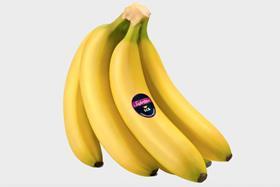
How has the Covid-19 pandemic impacted operations at Compagnie Fruitière? Have exotic items taken a hit?
Paul Bouzon: Since the start of the Covid-19 crisis, we have seen growth in consumption of locally produced fruit and vegetables. Sales of pineapples have been tough. They are a heavy fruit, and consumers have been focusing on more basic products, which thankfully include bananas. Banana consumption has been quite good during the lockdown, disappointing post-lockdown and up again in the summer.
The real problems have been in logistics and planification. Bringing fruit across the ocean, it has been difficult to adapt to the change in demand from retailers. In the UK, it’s been different, as most retailers work with contracts, so the planning has been more effective compared with France and southern Europe.
Is the UK a big market for Compagnie Fruitière?
PB: The UK is very important for us. Of course, Brexit is an uncertainty. We currently have operations in Dartford and Wigan, but we are closing down the Dartford facility and moving to London Gateway in early 2021. That way we will have a ripening facility right in the port. Logistically this will make our operations more fluid, with top-quality equipment at the site and the latest technology for ripening.
Are you opening any other facilities?
PB: Our new ripening facility in France, in Rungis, will be ready in January. We are moving from an old building to a new one where we will even have a micro plantation in a greenhouse. Our newest location is Romania, where we have a contract for a ripening facility. In Germany, we have taken the first step by opening an office. In Italy, we now have three ripening facilities, so we are moving in the right direction.
The key is to control the fruit from field to fork. We do this with all the fruits we sell. We handle in the ports, we transport and we ripen. This allows us to ripen the fruits exactly the way we want, which is key to the quality of our fruit. Our ripeners know the fruits, the origins and how they’re grown. This makes the difference. The ripening stage of the chain has a huge effect on the end quality of the product.
What about your sustainability efforts? Are they continuing apace?
PB: On the environmental side, we are continuously trying to improve our processes and practices. Four years ago, we began our partnership with WWF, with the aim of developing more sustainable banana production. This has two aspects: organic and agroecology.
In Africa, we are growing our plantations in Cote d’Ivoire and Ghana. Currently 10 per cent of our production area is organic and the target is to reach 20 per cent by 2025. We decided to move into Latin America and now have our own organic plantation in Ecuador. It is a bit like Ghana in that it has the perfect microclimate, quite dry, but close to the sea, and organic production is located quite far away from conventional sites.
The second aspect is to accelerate putting agroecological practices in place for conventional production. We can’t produce organic everywhere, in Cameroon for example, so we signed a partnership with Cirad to put in place innovative acroecological practices in our fields, to fight against black Sigatoka, get rid of insecticides and herbicides and develop microorganisms in the soil, which is key to having strong trees and long-lasting production. Cirad helps us directly in the field with multiple trials, the objective being to get rid of chemical treatments wherever possible. We know it won’t be feasible everywhere. We have an action plan laying out the timing. We call this B2A - Banane Agroécologique pour l’Afrique.
How is the move away from plastic packaging going?
PB: Plastic is a challenge. We don’t have all the solutions. Or if we do, they are expensive.
Are you planning any marketing campaigns in support of your SCB brand?
PB: We are launching a new range - SCB Suprême - for bananas, pineapples and mangoes. For bananas it’s new. They are bigger than average and take longer to grow, so the taste is slightly different. For pineapples we’ve had the brand for two years. They are produced at high altitude, in places like Cameroon near the volcanoes. We cut them at a later stage, when they are more mature with a higher sugar content. It is the same principle for mangoes from Côte d’Ivoire, which are chosen by hand to get the perfect maturity and colour. For pineapples, we've had the brand for two years, and it's been a success.
This is a new move to reinforce our SCB brand. We have an advertising campaign about it in France, as well as a B2B campaign in Europe in the press and online to promote Compagnie Fruitière as a supplier. We have a different image and level of awareness depending on the country – in some we are better known for bananas, in others pineapples – so we want to address this.
Are there any positives to take from the current pandemic?
PB: Covid-19 has reinforced our commitment to providing the safest conditions for our workers. It is crucial that the company always takes into account the people and the communities living and working in the areas we operate. It’s a long supply chain, and offering good working conditions is an essential part of it. Since the pandemic, people are beginning to appreciate the commitment of those continuing to do the necessary work to feed consumers in Europe. Individuals are taking a risk, so we have to show our commitment to them.
Eurofruit Magazine
Enjoyed this free article from Eurofruit Magazine and its team of editors? Don’t miss out on even more in-depth analysis, plus all the latest news from the fresh produce business. Subscribe now toEurofruit Magazine.



